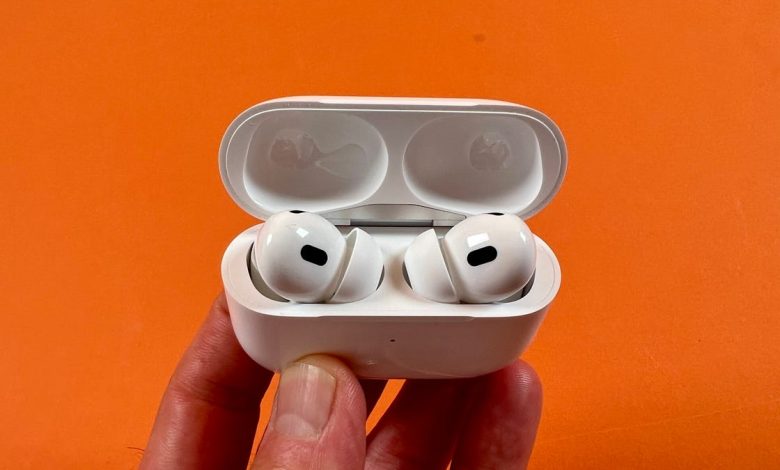Will AirPods Beat Out OTC Hearing Aids as Devices More People Will Use?

[ad_1]
New technology that enhances and personalizes our music and audio listening experience has led to new concerns about noise-induced hearing damage. But in case of Apple’s AirPodsat least, also carries new ways to improve hearing.
AirPods Pro include features and settings that can make it easier for people to hear the world around them when they have hearing problems in noisy environments. Rumors shared by Bloomberg’s Mark Gurman suggest the tech company may soon make a more official move in the world of hearing healthpotentially aligning with over-the-counter hearing aids that became available in the US in late 2022 for people with mild to moderate hearing loss.
So far, Apple hasn’t claimed that its AirPods are a hearing aid, a sound amplification product, or a medical device that would require special approval from the US Food and Drug Administration, though we may find out if that changes this Monday on Worldwide Developers Conference. Apple is expected to make multiple announcements about their productsAI usage and iOS 18 updates at the conference.
The over-the-counter market has given more people access to hearing aids: You used to need a prescription for all hearing aids, now you can buy OTC hearing aids in places like Walmart and Best buy. However, many people whose health could be improved by a hearing aid still do not receive it. According to Tricia Ashby-Scabis, senior director of audiology practices at the American Speech-Language Hearing Association, many people who have purchased a pair of over-the-counter hearing aids have returned them.
“I really think there’s a big expectation component,” Ashby-Scabis said of the less-than-ideal reception of hearing aids. “You can go into your local pharmacy and try out the readers and find the ones that are clearer,” she explained, but the same isn’t necessarily true of hearing aids, which require some adjustment and adjustment through trial and error.
Not only do people have to adjust to a new device, but their brains also have to adjust to the fresh auditory experience they’ve gone without, Ashby-Scabis explained. While AirPods can’t take away the adjustments to the hearing experience that people will need to make, they can make slight hearing improvements even easier to access for people who’ve been switching and fiddling with Apple devices and settings for years .
That idea is “why I kind of like the idea of AirPods,” Ashby-Scabis said. “People can play with them”
Read more: Apple announces preliminary insights from its hearing research.
AirPod features that can help people hear better
Ashby-Scabis owns a pair of AirPods, has heard their hearing enhancements discussed at conferences, and played around with some of the features. She is impressed, including by Live listening feature which allows you to use your iPhone or iPad as a directional microphone to pick up specific sounds in noisy environments, giving a more intentional element to hearing. (This works with AirPods, but also with some Beats devices.) Conversation Boost for AirPods Pro is another feature that helps you focus on the person in front of you who’s talking. There is often trouble hearing people speaking in noisy environments one of the first signs mild or moderate hearing loss.
“It’s something we encourage all the time with more traditional prescription hearing aids,” Ashby-Scabis said. “We’re still trying to get people to use accessories that can zoom in on certain people in some settings.”
To get hearing assist features on your AirPods, you’ll need to go into transparency mode, which is somewhat like a hearing aid because it fine-tunes the sounds of your environment to your specific hearing. You will need a a pair of AirPods Pro for that.
You can toggle with transparency mode by going to Settings on your iPhone or iPad. Then choose Accessibility > Audio and visual then select Headphone compartment. From there you can choose Custom audio setting and even upload results from an audiogram or hearing test so it’s the most personalized. Once Transparency Mode is on, you can further adjust it under Headphone placement and turn on Call Amplification or play with the gain setting.
Even making small changes like playing with the brightness or making things sound clearer can help some people who may have started to lose some hearing.
“I think increasing the brightness can really make a difference for those people who are starting to lose some high frequencies,” Ashby-Scabis said. “And it helps them insert those consonants, which gives them a little more clarity of speech.”
Read more: 10 tips to reduce your risk of hearing loss
How AirPods compare to hearing aids
Some research so far suggests this AirPods Pro perform just as well as a basic hearing aideven if they still are beaten by more premium models. There is a wide range of hearing aids, ranging from personal to unregulated sound reinforcement productswhich are designed for situations where you want louder sounds, to over-the-counter hearing aids for mild to moderate hearing loss and prescription hearing aids.
In order for Apple to sell its products as hearing aids or devices for people with hearing loss, it will have to comply with regulations put in place by the FDA. Again, it’s currently unclear whether Apple will ever adjust its features to be even more like hearing aids, or whether it will change its marketing so that they are more closely aligned with the OTC products that are now the terrain of other technology companies like Sony.
Even if they don’t, the newer AirPods provide a way for people to better engage with others and their environment. For starters, the AirPods Pro 2 are right now run just over $200. And while this is far from average $4000 and something price of prescribed hearing aids, a a good pair of OTCs will still see you through at least a few hundred dollars.
Taking hearing health as seriously as other aspects of health is a feat, according to Ashby-Scabis. But she says the public and the medical community are catching on to all the ways hearing can affect our health. cognitive effects and physical conditions that may also be related to hearing.
“It’s not that hearing loss causes the health problems, but untreated hearing loss leads to depression, social isolation,” Ashby-Scabis said. “You start to see people withdraw, become more sedentary – it can have such an impact on a person’s overall health.”
[ad_2]




